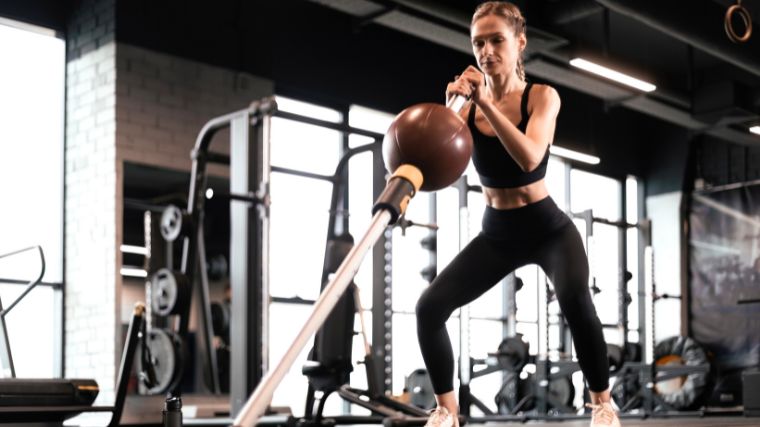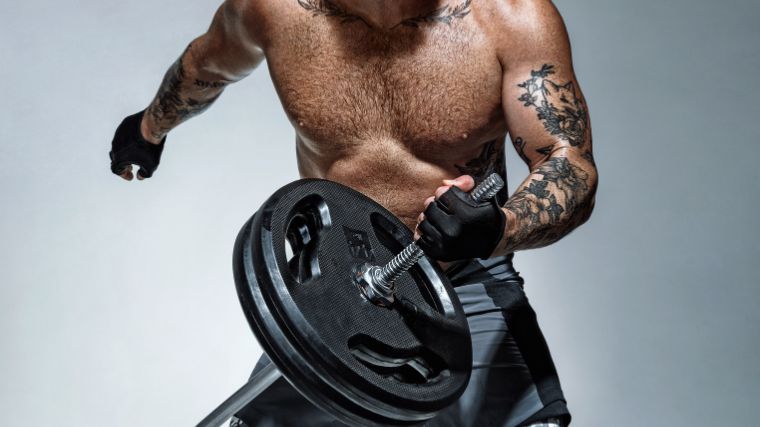When it comes to shoulder training, most folks base their workouts on a combination of free weights and cables. After all, nothing beats the barbell overhead press for raw strength, and it’s hard to match the pump provided by a good set of cable lateral raises.
However, what do you do when all the squat racks are taken, or the cable stations aren’t working? What if you’re just bored to tears with your current shoulder workout routine?

As it turns out, wedging a barbell into a landmine station (or the corner of wall, even) can transform its utility and put a fresh spin on your shoulder session at the same time. Try out these six landmine shoulder exercises during your next workout:
6 Best Landmine Shoulder Exercises
- Single-Arm Landmine Shoulder Press
- Single-Arm Landmine Push Press
- Landmine Lateral Raise
- Meadows Row
- Landmine Hex Press
- Landmine Upright Row
1. Single-Arm Landmine Shoulder Press
Off the bat, any well-designed shoulder workout should contain a pressing movement of some sort. Overhead pressing develops your front delts, while also providing some stimulation to your triceps, upper pecs, and core.
[Read More: The 10 Best Arm Exercises for Major Muscle Growth]
One of the biggest drawbacks of the landmine station is its relative lack of loadability; you may not be able to practically load enough weight to make a standard two-armed press viable. Pressing with one arm will make even light weights challenging and provide the stability-related benefits of unilateral exercise as well.
How to Do It
- Wedge a bar into the landmine attachment or the corner of a wall.
- Load your plates and pick up the end of the bar’s sleeve.
- Stagger your feet while facing the landmine with the end of the bar in your palm and your upper arm tucked against your torso.
- From here, press the bar up and outward until your elbow is fully extended.
Coach’s Tip: You can place your free hand on your hip or hold it aloft for extra stability.
Sets and Reps: Do 3 to 4 sets of 8 to 12 repetitions.
2. Single-Arm Landmine Push Press
You can also use the landmine station to develop explosive power. Landmine shoulder exercises are well-suited for movements like the push press due to their unique force curve.
[Read More: Push Press vs. Power Jerk: Which Barbell Lift Should You Do?]
Instead of simply using your legs to drive a bar straight up off your shoulders, the landmine requires you to generate multi-directional force. You have to push both forward and upward simultaneously.
How to Do It
- Set up with the end of a bar in your hand as you would for the single-arm strict landmine press.
- Keep your feet together and under your hips; don’t stagger them.
- Begin the movement by bending at the knees and hips and sinking into a partial squat.
- Drive explosively into the floor with your legs.
- Push the end of the bar up and out as you forcefully extend your lower body.
Coach’s Tip: Don’t extend your arm until you’ve fully pushed your legs into the floor.
Set and Reps: Try 4 to 5 sets of 3 to 6 repetitions.
3. Landmine Lateral Raise
To build robust, three-dimensional deltoids, you need to train all three heads of the muscle. If you want to target your lateral delts, you need to do some lateral raise variation. Ditch the dumbbells — not that there’s anything wrong with a good set of dumbbells — and head to the landmine station instead.
Landmine lateral raises will put a fresh spin on a movement you’ve probably done plenty of already. The novelty should induce some new hypertrophy and, as a bonus, you’ll get some extra grip work in by holding the shaft with your fingers.
How to Do It
- Stand facing away from the landmine station with the sleeve of a barbell held in your working hand.
- From here, lift your arm out to the side until it is roughly parallel to the floor.
Coach’s Tip: Actively brace your core to avoid tilting your torso as you lift the weight.
Sets and Reps: Go for 2 to 3 sets of 12 to 15 repetitions on this one.
4. Meadows Row
Named for the late great bodybuilding coach John “Mountain Dog” Meadows, the Meadows row is both a back-builder and a phenomenal exercise for targeting your rear delts.
[Read More: Use the Bent-Over Row to Make Big Gains With Big Weights]
Meadows rows will build up that small, hard-to-reach muscle by design; the movement encourages a lot of shoulder extension as you drive your elbow behind your torso, which emphasizes the rear delts. As a bonus, you’ll get plenty of free upper back work in as well.
How to Do It
- Stand perpendicular to the end of a barbell that is fixed into the landmine station.
- Perform a hip hinge and bend over to grab the end of the bar with your working arm.
- From here, row the bar upward, driving your elbow high behind your body until your hand comes close to your torso.
Coach’s Tip: Avoid twisting your torso toward your working side as you row. Keep it square.
Sets and Reps: Bang out 3 or 4 sets of 8 to 12 repetitions on this one.
5. Landmine Hex Press
The hex press is one of the best ways to build up both your front delts and your upper chest at the same time. Most of the time, the hex press is performed with a pair of dumbbells. Should you not have any on hand, you can make do with the landmine station instead.
[Read More: The 7 Best Upper Chest Exercises for Strength and Size]
The landmine hex press will absolutely torch your front delts, upper chest, and triceps. It also works great as a finisher to cap off your next upper body push workout.
How to Do It
- Take a knee facing a barbell that has been hooked into the landmine station.
- Pick up the end of the bar and hold it at your chest, cupping it by clasping your hands together.
- From here, push the end of the bar up and away from your body, straightening your elbows and squeezing your pecs.
Coach’s Tip: Hold the top of the range of motion for a beat to emphasize the isometric contraction.
Sets and Reps: Your best bet here is to do 2 or 3 sets of 12 to 15 repetitions.
6. Landmine Upright Row
Contrary to what you may have heard, the upright row is not inherently dangerous for your shoulders. In fact, it’s a great way to target multiple sections of your shoulder at the same time, and the landmine fixture is the perfect piece of equipment for it.
[Read More: How to Do the Pendlay Row for Back Size and Stronger Lifts]
The landmine upright row provides a unique movement curve that may alleviate some of the discomfort associated with standard barbell upright rows. You may also find it less awkward on the wrists, since you can maintain a neutral wrist position for most of the exercise’s range of motion.
How to Do It
- Stand perpendicular to the landmine fixture with the end of the barbell on the floor directly in front of your feet.
- Pick the end of the bar up with your working arm and hold it in front of your torso.
- Then, row it upward, keeping it close to your body.
- Drive your elbow up and out to the side until your hand passes chest height.
Coach’s Tip: Think about lifting the end of the bar both up and out to the side.
Sets and Reps: Go for 2 to 3 sets of 8 to 15 repetitions on this one.
Shoulder Warm-Up
Your workout is only as good as your warm-up. That’s as true on shoulder day as back day or for any other workout you perform during the week. To make the most of your landmine shoulder training, your delts and upper back should be primed to perform. Try this shoulder-friendly warm-up circuit:
- 5 to 10 minutes of low-intensity, steady-state cardio.
- 2 sets of 20-second dead hangs from a pull-up bar.
- 2 sets 20 resistance band pull-aparts.
- 2 sets of 20 resistance band shoulder presses.
How To Train Your Shoulders
If you want to build up your delts, you can stride into the gym, slam a few sets of overhead presses, and call it a day. Is that a job well done? Far from it. Take heed of these programming principles before your next delt day and your workouts (and results) will be all the better for it.
Shoulder Exercise Selection
Your shoulders are an extremely versatile muscle group, mostly due to their anatomical design. Your scapula floats freely on the back of your ribcage and is articulated by many different muscles, including the three heads of your deltoid.
In simple terms, this means you need to take a three-pronged approach to your shoulder workouts to guarantee comprehensive, balanced development.

[Read More: Try These Dumbbell Shoulder Workouts to Build Strength, Size, or Get
Flexible]
A horizontal or vertical pressing movement will target your anterior deltoids. Some sort of lateral raise will hit the side of your shoulder, and a flared-arm row or flye that pulls your arm behind your body will engage your rear delts. You can perform all of these anatomical functions with the landmine station.
Shoulder Sets and Reps
In terms of muscular fiber type composition, the deltoid architecture is basically a 50/50 split between Type-I and Type-II fibers. (1) In real-world terms, this means that your delts can respond to a variety of different repetition ranges. But, there are some general guidelines you should follow:
- For Presses: Go heavy-ish, working with 2 to 4 sets of 5 to 8 repetitions most of the time.
- For Front, Side, or Rear Raises: Perform higher volumes with lighter weights; 3 to 5 sets of 12 to 20 repetitions.
Shoulder Training Tips
The ideal shoulder workout — whether you’re working out entirely with the landmine or using a variety of equipment — is both high-effort and smartly designed. Keep these tips in mind when putting your workouts together.
Warm Up Thoroughly
The shoulder joint is, bar none, the most flexible joint in the human body. Some people even possess a full 360 degrees of usable rotation at the shoulder. While more range of motion is broadly better than less, this does pose a risk if you’re new to delt training, especially with a new implement like the landmine.
You need to master your range of motion before you load it with high-intensity training. So, if certain shoulder exercises are new to you, take time to warm up your joints beforehand. This will ensure that you’re consciously aware of where your shoulder is in space and that the joint capsule itself is properly lubricated.
Embrace Instability
Some data has shown that your deltoids respond well when worked in low-stability environments. (2) Why isn’t exactly clear — it may be due to the nature of the scapula itself, which isn’t the most stable joint in your body by default.

[Read More: The 15 Best Shoulder Exercises for Stability, Power, and Aesthetics]
Regardless, there’s evidence backing the idea that working with an implement like the landmine may increase the relative instability of your kinetic chain, engaging your delts more in the process.
Benefits of the Landmine Station
You may not think of the landmine as the de-facto piece of equipment for building the shoulders. While that may be true, that doesn’t mean it is useless — far from it, actually. The landmine has a few stellar benefits behind it for delt training specifically.
Easy to Use
You can’t beat convenience, especially if you work out in a crowded gym. Most facilities have at least one landmine station, and it often goes unused.
If you have access to a barbell (or the corner of a room), you can fashion yourself a landmine-based workout in the blink of an eye. Slide the sleeve into the fixture or wedge it into the corner and you’re off to the races. No squat rack required.
Highly Versatile
The design of the landmine station makes it extremely versatile. Think of it as the opposite of the Smith machine, which, while valuable, is somewhat limited in its utility since the bar can only move vertically in space.
The landmine station offers you a variety of different exercises that you can perform from different angles for both your upper and lower body.
Multi-Planar Movement
One of the best and most unique features of the landmine station is its unique plane of motion. When performing landmine shoulder exercises, the resistance moves in an arc. This is distinct from how you’d usually use free weights, which generally move vertically, or machines, which put your movement on rails altogether.

This multi-planar movement enhances exercises like the lateral raise or upright row by altering the resistance curve, making them more challenging at points that they’re easiest if performed with other equipment.
What Muscles Make Up the Shoulders
Your shoulders are far more intricate than you might think at a glance. There are three primary compartments to the deltoid, each with their own distinct function.
- Anterior Deltoid: The frontal aspect of the deltoid originates the clavicle and inserts onto the upper arm. This muscle assists with shoulder flexion; raising your arm in front of your body.
- Lateral Deltoid: The middle compartment of your delts begins on your scapula, or shoulder blade, and connects onto your upper arm. Your lateral delts perform the unique function of raising your arm out to the side.
- Posterior Deltoid: The small and discrete posterior deltoid begins on the scapula and connects to the upper arm as well. This muscle affects general shoulder stability as well as horizontal abduction; drawing your arm out and back behind your midline.
More Training Content
- The Best Back and Shoulder Workout You Can Do, No Matter Your Experience Level
- Six Bodybuilding Weak Points You Might Have (and How To Fix Them)
- The Ultimate Guide to Getting Started With Strength Training
References
- Srinivasan, R. C., Lungren, M. P., Langenderfer, J. E., & Hughes, R. E. (2007). Fiber type composition and maximum shortening velocity of muscles crossing the human shoulder. Clinical anatomy (New York, N.Y.), 20(2), 144–149.
- Saeterbakken, A. H., & Fimland, M. S. (2013). Effects of body position and loading modality on muscle activity and strength in shoulder presses. Journal of strength and conditioning research, 27(7), 1824–1831.
Featured Image: RomarioIen / Shutterstock